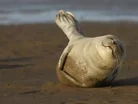Crossrail’s final shipment of earth arrives at Wallasea Island bird sanctuary

The last of 1,528 shipments of excavated material – three million tonnes of it in all – donated by Crossrail to one of Europe’s largest nature reserves has arrived at Wallasea Island in Essex.
In a landmark partnership with the Royal Society for the Protection of Birds (RSPB), the material excavated from deep below the capital is being used to create a flagship wetland nature reserve twice the size the City of London, and one of the UK’s most innovative flood defence systems.
The delivery marks an important countdown for Crossrail and the RSPB. With over 24 out of 26 miles of tunnelling complete, Crossrail is on track to link all its rail tunnels with the big east/west breakthrough at Farringdon. At Wallasea, the last load of excavated material will be used to complete the first area of the reserve and allow the sea wall to be breached and controlled flooding to take place this summer.
Mike Clarke, the RSPB's Chief Executive said: “Wallasea Island is the biggest wetland creation project the RSPB has embarked upon and one of the most significant across Europe to date. As well providing the material that makes this project possible, Crossrail has demonstrated a bold and inspired vision for the way in which industry and conservation sectors can work together for the benefit of people and wildlife.
“As the pressures on our natural world continue to grow, it is crucial that we recognise a world class economy and a world class environment go hand in hand. We hope that our partnership with Crossrail will inspire many more groundbreaking projects in future.”
Andrew Wolstenholme, Crossrail Chief Executive said: “Crossrail is delighted to be involved in delivering this major new wetland at Wallasea. This trailblazing partnership with the RSPB is a key part of Crossrail’s sustainability strategy and shows that by working together, the construction industry and environmental groups can benefit both the economy and the environment.”
A total of over 6 million tonnes of material will be excavated by the Crossrail project – enough to fill Wembley stadium 3 times. 99 percent of the material has been reused or recycled with half being donated to the RSPB for Wallasea and the remainder used for agricultural land and recreational facilities.
Nearly 80 percent of Crossrail’s excavated material has been transported by train and ship on a tonne per kilometre basis, removing 150,000 lorries off the streets of London.
Excavated material from Crossrail’s stations was transported to the Docklands Transfer Site at Barking Riverside before being shipped to Wallasea. Material from Crossrail’s western tunnels was transported by rail from Westbourne Park to Northfleet in Kent before being shipped to Wallasea.
The Wallasea Island Wild Coast Project is using excavated material from Crossrail’s tunnels to re-profile the land to allow for a mosaic of lagoons and raised islands once the sea wall is breached later this year. It will transform 670 hectares of farmland back into coastal marshland as it was 400 years ago. It will provide a thriving wetland for tens of thousands of migratory birds and help to combat future impacts of climate change on people and wildlife including coastal flooding.
The RSPB will require more than ten million tonnes of excavated material to create the reserve and is currently seeking partners to provide the remaining seven million tonnes.



